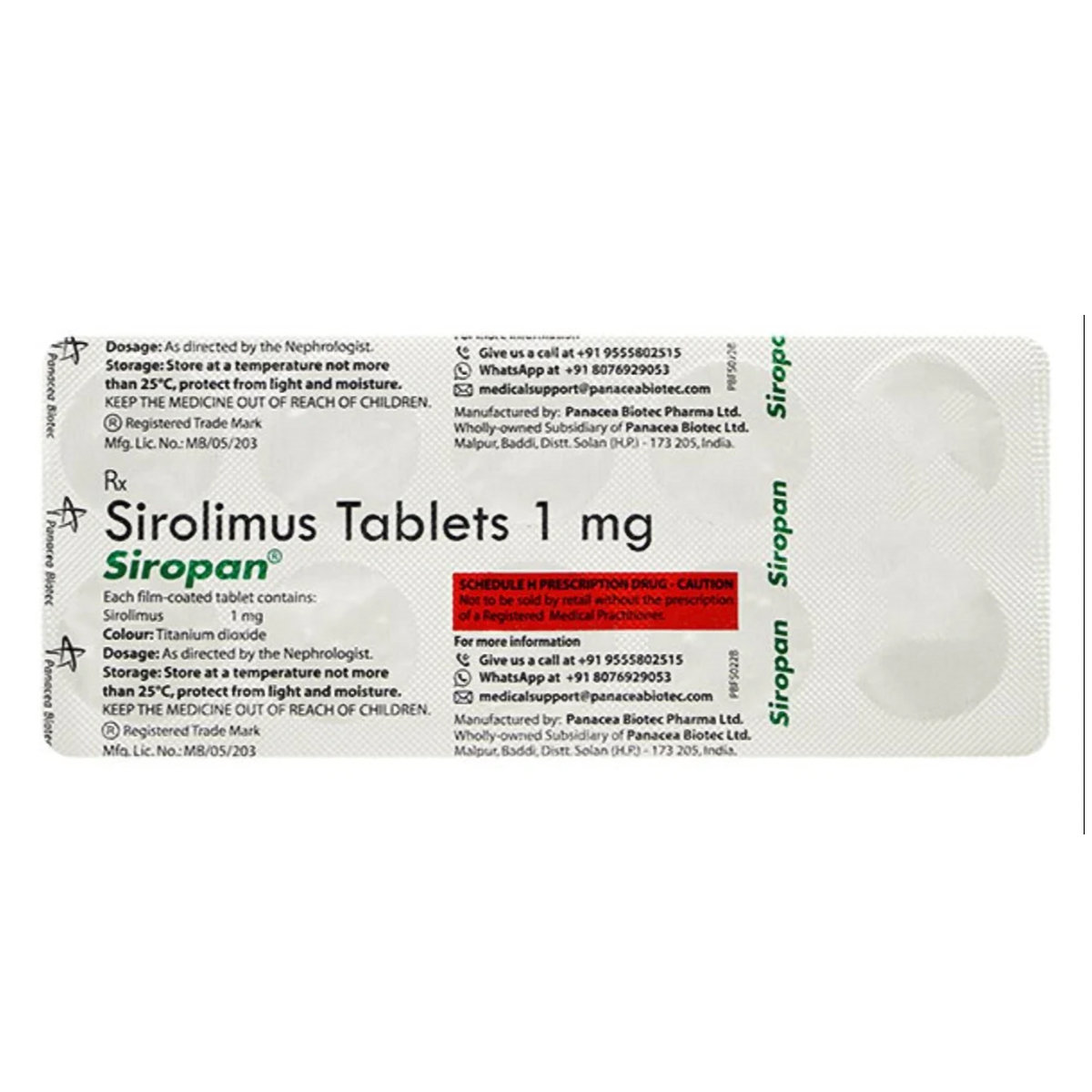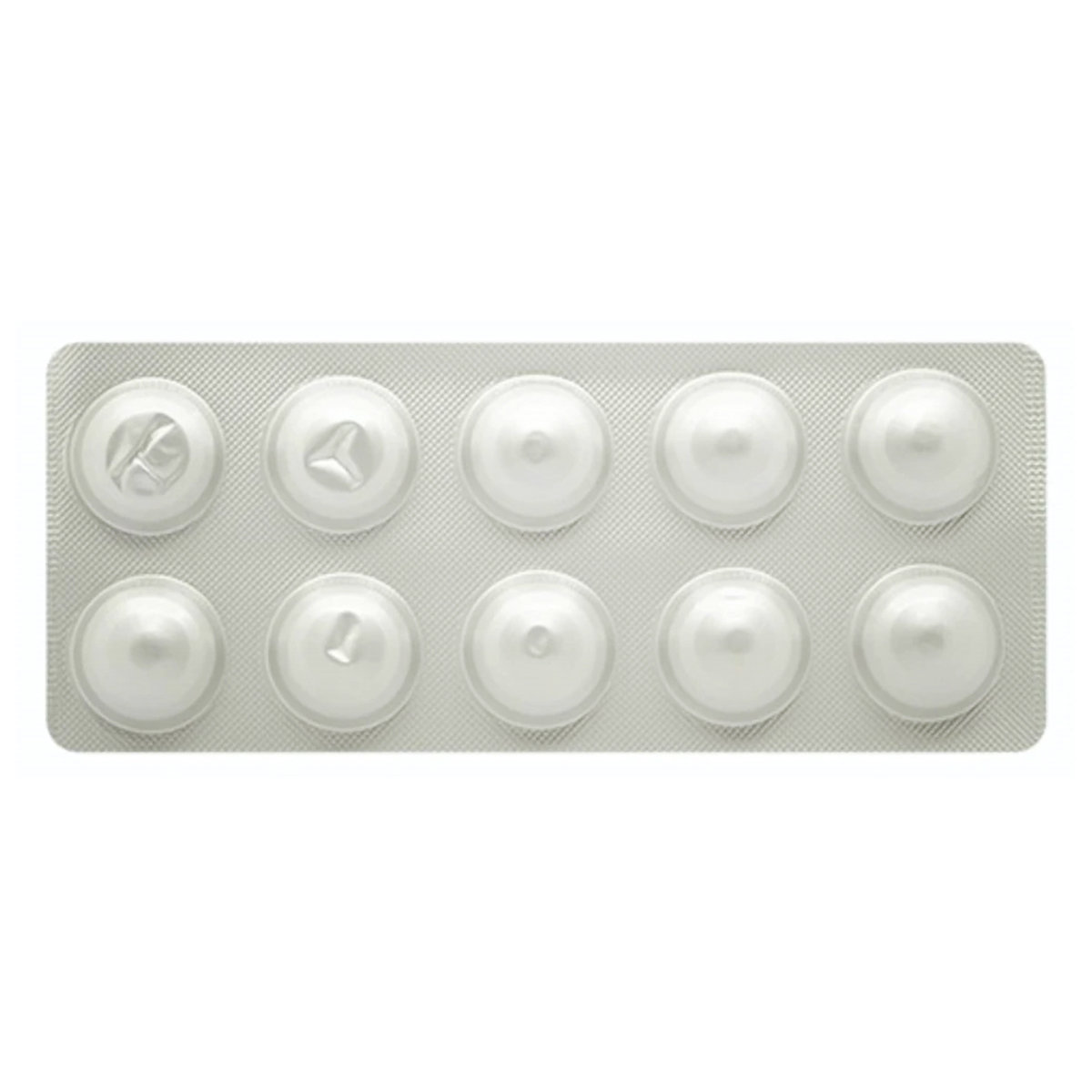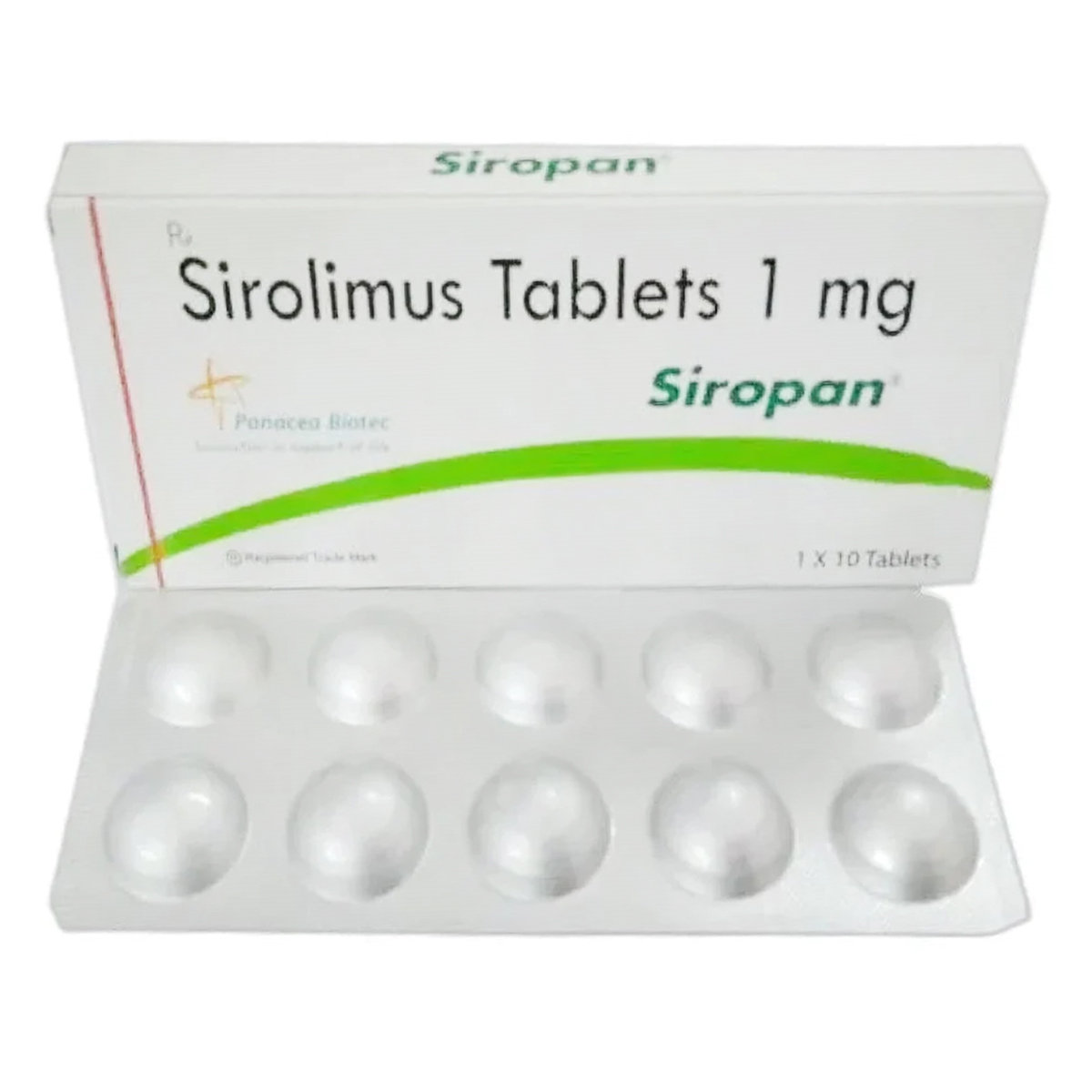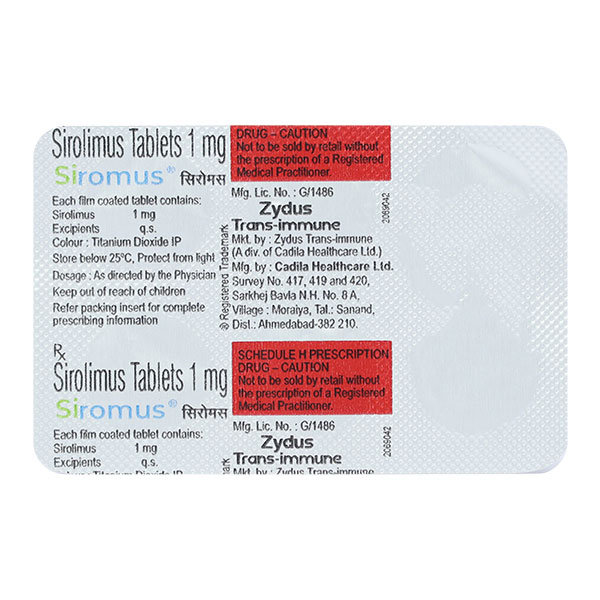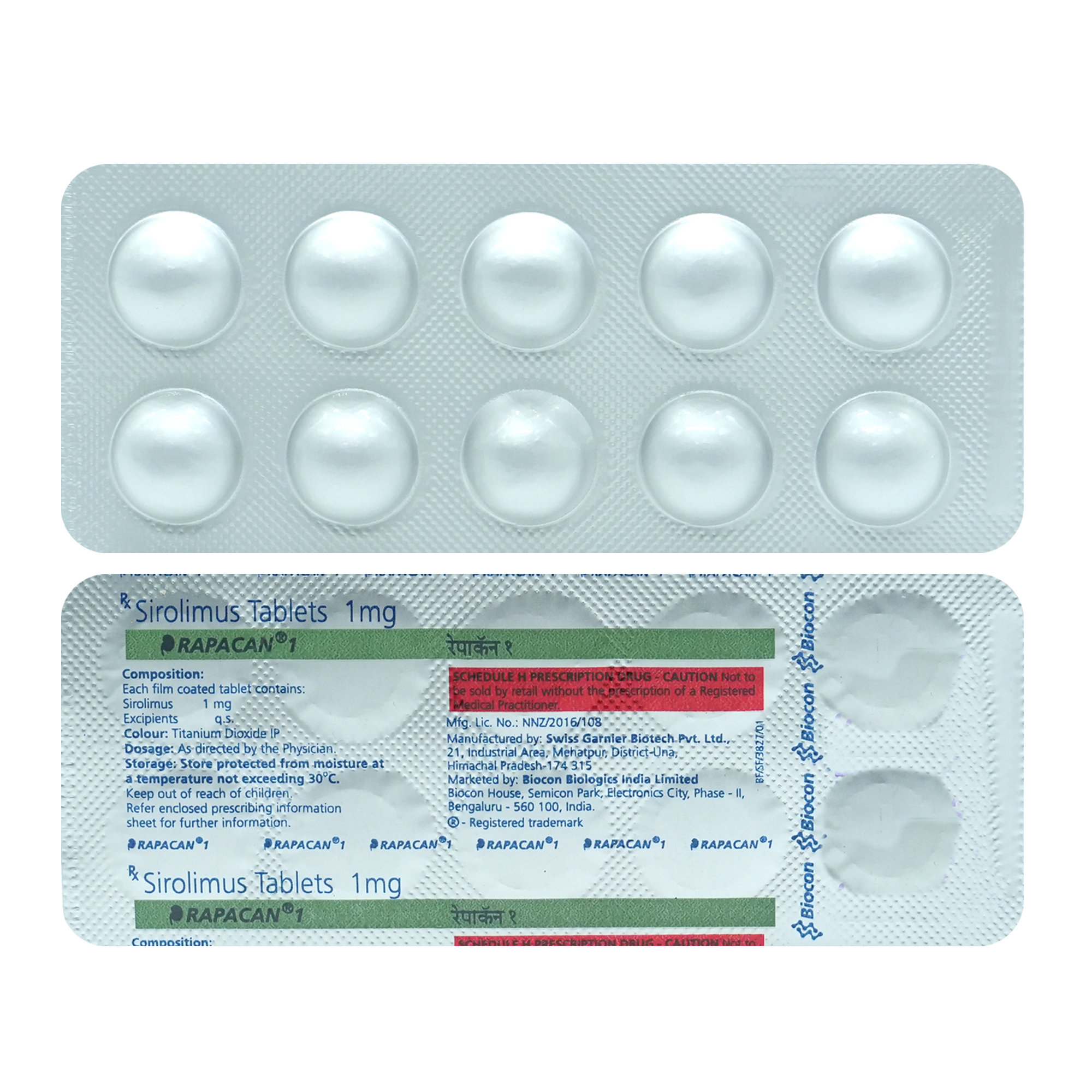SIROPAN TABLET
MRP ₹2303.5
(Inclusive of all Taxes)
₹345.5 Cashback (15%)
Provide Delivery Location
Online payment accepted
 Prescription drug
Prescription drugWhats That
Composition :
Manufacturer/Marketer :
Consume Type :
Expires on or after :
Return Policy :
About SIROPAN TABLET
SIROPAN TABLET belongs to a class of drugs called 'immunosuppressants' used to prevent organ rejection after a transplant. Organ rejection occurs when a patient's immune system recognizes the donor organ as foreign and tries to eliminate it.
SIROPAN TABLET contains Sirolimus is an immunosuppressant. It weakens your body's defence system (immune system) to help your body accept the new organ as if it were your own. Thereby preventing organ rejection in transplanted patients and assisting the body in accepting the new organ.
Use SIROPAN TABLET as prescribed by your doctor. You are advised to use SIROPAN TABLET for as long as your doctor has prescribed it based on your medical condition. Some people may experience abdominal pain, diarrhoea, headache, fever, urinary tract infection, anaemia, nausea, arthralgia, pain, and oedema. Most of these side effects of SIROPAN TABLET do not require medical attention and gradually resolve over time. However, if the side effects persist or worsen, please consult your doctor.
To treat your condition effectually, continue using SIROPAN TABLET for as long as your doctor has prescribed it. Do not use SIROPAN TABLET without a doctor's advice if you are allergic to SIROPAN TABLET or other medicines. Consult your doctor before using SIROPAN TABLET if you are pregnant or breastfeeding. Avoid alcohol consumption with SIROPAN TABLET as it may increase the risk of severe adverse effects. Keep your doctor informed about your health condition and all the medicines you take before taking SIROPAN TABLET to rule out any side effects.
Uses of SIROPAN TABLET
Directions for Use
Key Benefits
SIROPAN TABLET contains Sirolimus is an immunosuppressant. It weakens your body's defence system (immune system) to help your body accept the new organ as if it were your own. Thereby preventing organ rejection in transplanted patients and assisting the body in accepting the new organ.
Storage
- Tell your doctor immediately if you experience shortness of breath after taking medication.
- Your doctor may adjust the medication regimen or dosage or give alternative medical procedures to minimize the symptoms of shortness of breath.
- Monitor your oxygen levels and breathing rate regularly to track changes and potential side effects.
- For controlling stress and anxiety, try relaxation techniques like deep breathing exercises, meditation, or yoga.
- Make lifestyle changes, such as quitting smoking, exercising regularly, and maintaining a healthy weight.
- Seek emergency medical attention if you experience severe shortness of breath, chest pain, or difficulty speaking.
- Follow up regularly with your doctor to monitor progress, adjust treatment plans, and address any concerns or questions.
- Exercise for at least 30 minutes most days of the week.
- Limit alcohol consumption.
- Consider a low carbohydrate diet that limits grains, starchy vegetables and fruit. Include foods rich in protein and fat.
- Avoid excess sugar, fatty foods and carbohydrates.
- Aim for weight loss as it helps to improve cardiovascular health and minimize the risk of complications related to obesity.
- Wear compression garments like stockings, sleeves, or gloves to apply pressure and help stop fluid from building up, especially after the swelling goes down.
- Move around and do exercises to help the fluid circulate, especially in swollen limbs. Ask your doctor for specific exercises.
- Raise the swollen area above your heart level several times a day, even while sleeping, to help reduce swelling.
- Gently massage the swollen area with firm but not painful pressure.
- Keep the swollen area clean and moisturized to prevent injury and infection.
- Reduce salt intake to help prevent fluid from building up and worsening the swelling, as advised by a doctor.
- If the swelling does not get better after a few days of home treatment or worsens, consult your doctor right away.
- Inform your doctor about your constipation symptoms. They may adjust your medication or advise alternative treatments.
- Stay hydrated by drinking sufficient of water (at least 8-10 glasses a day) to help soften stool and promote bowel movements.
- Increase fibre intake by eating foods high in fibre, such as fruits, whole grains, vegetables and legumes, to help bulk up the stool.
- Establish a bowel routine by trying to go to the bathroom at the same time each day to train your bowels.
- Engaging in regular exercise, like walking or yoga, can support in bowel movement stimulation.
- Consult your doctor if constipation persists, and discuss alternative treatments or adjustments to your medication.
- Include iron-rich foods like dark leafy vegetables, lean red meat, legumes and fish in your diet.
- Consume vitamin C-rich foods as they aid iron absorption.
- Limit tea, cocoa, and coffee as these can slow iron absorption.
- Exercise regularly; however, do not overdo it.
- Inform your doctor about the medication you're taking and the UTI symptoms you're experiencing.
- Your doctor may adjust your medication regimen or consider alternative medications or dosages that may reduce the risk of UTIs.
- Drink plenty of water (at least 8-10 glasses a day) to help flush out bacteria. Avoid sugary drinks and caffeine, which can exacerbate UTI symptoms.
- Urinate when you feel the need rather than holding it in. This can help prevent bacterial growth and reduce the risk of UTIs.
- Consider cranberry supplements: Cranberry supplements may help prevent UTIs by preventing bacterial adhesion.
- Monitor UTI symptoms and report any changes to your doctor.
- If antibiotics are prescribed, take them as directed and complete the full course.
- Please inform your doctor about joint pain symptoms, as they may adjust your medication regimen or prescribe additional medications to manage symptoms.
- Your doctor may prescribe common pain relievers if necessary to treat joint discomfort.
- Maintaining a healthy lifestyle is key to relieving joint discomfort. Regular exercise, such as low-impact sports like walking, cycling, or swimming, should be combined with a well-balanced diet. Aim for 7-8 hours of sleep per night to assist your body in repairing and rebuilding tissue.
- Applying heat or cold packs to the affected joint can help reduce pain and inflammation.
- Please track when joint pain occurs and any factors that may trigger it, and share this information with your doctor to help manage symptoms.
- If your joint pain is severe or prolonged, consult a doctor to rule out any underlying disorders that may require treatment.
Drug Warnings
Therapeutic drug monitoring is required for all patients receiving SIROPAN TABLET. To treat your condition effectually, continue using SIROPAN TABLET for as long as your doctor has prescribed it. Do not use SIROPAN TABLET without a doctor's advice if you are allergic to SIROPAN TABLET or other medicines. Consult your doctor before using the SIROPAN TABLET if you are pregnant or breastfeeding. Avoid alcohol consumption with SIROPAN TABLET as it may increase the risk of severe adverse effects. Do not use SIROPAN TABLET in more than prescribed doses or longer duration as it may cause adverse effects. And also, keep your doctor informed about your health condition and all the medicines you take before taking SIROPAN TABLET to rule out any side effects.
Drug-Drug Interactions
Drug-Drug Interactions
Login/Sign Up
Coadministration of Siropan Tablet with the BCG vaccine can make the vaccine less effective.
How to manage the interaction:
Taking Siropan Tablet with the BCG vaccine is not recommended, they can be taken together if advised by your doctor. However, contact your doctor if you experience any symptoms. Do not stop taking any medications without consulting a doctor.
Coadministration of Siropan Tablet with Mifepristone can increase the levels of Siropan Tablet in the blood, which can increase the risk or severity of side effects.
How to manage the interaction:
Taking Siropan Tablet with Mifepristone is not recommended, they can be taken together if a doctor advises. However, contact a doctor if you experience any symptoms like back pain · difficulty falling asleep or staying asleep, fever, headache, joint pain, rash, stomach pain, constipation, or diarrhea. Do not stop taking any medications without consulting a doctor.
Co-administration of Cidofovir and Siropan Tablet can increase the risk or severity of Kidney problems.
How to manage the interaction:
Taking Siropan Tablet with Cidofovir is not recommended, but it can be taken together if prescribed by a doctor. However, if you experience nausea, vomiting, loss of hunger, increased or decreased urination, sudden weight gain or loss, fluid retention, swelling, shortness of breath, muscle cramps, tiredness, weakness, dizziness, confusion, or an irregular heart rhythm, consult a doctor. Do not discontinue any medications without consulting a doctor.
Coadministration of Siropan Tablet with posaconazole can lower the levels of Siropan Tablet in the blood.
How to manage the interaction:
Although there is an interaction between posaconazole with Siropan Tablet, they can be taken together if a doctor advises. However, if you experience any unusual symptoms contact a doctor immediately. Do not discontinue any medications without consulting a doctor.
Coadministration of Siropan Tablet and Voriconazole can increase blood levels and side effects of Voriconazole.
How to manage the interaction:
Taking Voriconazole with Siropan Tablet is generally avoided as it can result in an interaction, please consult a doctor before taking it. Contact a doctor if you experience nausea, fever, abdominal pain, or yellowing of the skin or eyes. Do not stop using any medication without consulting a doctor.
Coadministration of Siropan Tablet and Infliximab are taken together, it can lead to or increase the risk or severity of serious infections.
How to manage the interaction:
There may be a possibility of interaction between Infliximab and Siropan Tablet, but it can be taken if prescribed by a doctor. However, if you experience symptoms of fever, chills, diarrhea, sore throat, muscle aches, shortness of breath, weight loss, red or inflamed skin, body sores, and pain or burning during urination, contact a doctor immediately. Do not discontinue any medications without consulting a doctor.
Co-administration of Bacitracin and Siropan Tablet can increase the risk or severity of Kidney problems.
How to manage the interaction:
Co-administration of Siropan Tablet with Bacitracin can possibly result in an interaction, but it can be taken if your doctor has advised it. However, if you experience nausea, vomiting, a decrease in hunger, increased or decreased urine, weight gain or loss that occurs suddenly, fluid retention, swelling, difficulty breathing, muscle pain, fatigue, weakness, dizziness, confusion, and irregular heartbeat, consult a doctor. Do not discontinue any medications without a doctor's advice.
Co-administration of Diclofenac with Siropan Tablet may increase the risk or severity of kidney problems.
How to manage the interaction:
Co-administration of Diclofenac and Siropan Tablet can lead to an interaction, but it can be taken if advised by a doctor. However, consult a doctor if you experience any symptoms like nausea, vomiting, loss of appetite, increased or decreased urination, sudden weight gain or weight loss, fluid retention, swelling, shortness of breath, muscle cramps, tiredness, weakness, dizziness, confusion, and irregular heart rhythm. Do not discontinue any medications without consulting a doctor.
Co-administration of Siropan Tablet with Methotrexate can increase the risk or severity of kidney damage.
How to manage the interaction:
Although there is a possible interaction between Siropan Tablet and methotrexate, you can take these medicines together if prescribed by a doctor. However, if you experience nausea, vomiting, a decrease in hunger, increased or decreased urine, weight gain or loss that occurs suddenly, fluid retention, swelling, difficulty breathing, muscle pain, fatigue, weakness, dizziness, confusion, and irregular heartbeat, consult a doctor. Do not discontinue any medications without a doctor's advice.
Co-administration of Mefenamic acid with Siropan Tablet can increase the risk or severity of kidney disorders.
How to manage the interaction:
Taking Mefenamic acid with Siropan Tablet together can result in an interaction, but it can be taken if a doctor has advised it. However, if you notice any unusual bleeding or bruising, other signs of bleeding, dizziness, lightheadedness, red or black tarry stools, coughing up or vomiting blood, severe headache, and weakness, you should contact a doctor immediately. Do not stop using any medications without talking to a doctor.
Drug-Food Interactions
Drug-Food Interactions
Login/Sign Up
Grapefruit Juice, Grapefruit
How to manage the interaction:
Taking Siropan Tablet with Grapefruit and Grapefruit juice may increase the side effects of Siropan Tablet. Avoid or limit consumption of Grapefruit and Grapefruit juice while taking Siropan Tablet.
Side Effects of SIROPAN TABLET
- Peripheral oedema
- Hypertriglyceridemia
- Hypertension
- Hypercholesterolemia
- Creatinine increased
- Abdominal pain
- Diarrhoea
- Headache
- Fever
- Urinary tract infection
- Anaemia
- Nausea
- Arthralgia
- Pain
- Thrombocytopenia
Habit Forming
Therapeutic Class
All Substitutes & Brand Comparisons
RX
Out of StockSiroglob 1mg Tablet
₹71
(₹6.39 per unit)
96% CHEAPERRX
Out of StockROCAS TABLET
Emcure Pharmaceuticals Ltd
₹128
(₹19.2 per unit)
90% CHEAPERRX
SiroRite Tablet 10's
Elera Pharma Ltd
₹1218.5
(₹109.67 per unit)
47% CHEAPER
Author Details
We provide you with authentic, trustworthy and relevant information
Drug-Diseases Interactions
Drug-Diseases Interactions
Login/Sign Up
FAQs
Drug-Drug Interactions Checker List
- MYCOPHENOLATE MOFETIL
- MYCOPHENOLIC ACID
- LORATADINE
- LOSARTAN
- INSULIN ASPART
- INSULIN GLARGINE
Disease/Condition Glossary
Organ rejection occurs when a patient’s immune system recognizes the donor organ as foreign and tries to eliminate it.

Have a query?
Alcohol
Safe if prescribed
It is advised to avoid alcohol intake since it may worsen the side effects.
Pregnancy
Consult your doctor
Consult your doctor, and there is no substantial research yet on the use of SIROPAN TABLET in pregnant women.
Breast Feeding
Consult your doctor
Consult your doctor, and there is no substantial research yet on the use of SIROPAN TABLET in breastfeeding/nursing mothers.
Driving
Safe if prescribed
Do not drive or operate machinery if you experience dizziness or drowsiness while using SIROPAN TABLET. SIROPAN TABLET can also sometimes cause dizziness/drowsiness; hence avoid driving in such situations. Seek medical attention if the symptoms persist longer.
Liver
Consult your doctor
Please consult your doctor if you have any concerns regarding using SIROPAN TABLET in patients with liver impairment. Your doctor will prescribe only if the benefits outweigh the risks.
Kidney
Consult your doctor
Please consult your doctor if you have any concerns regarding using SIROPAN TABLET in patients with kidney impairment. Your doctor will prescribe only if the benefits outweigh the risks.
Children
Safe if prescribed
There is limited information available on the use of SIROPAN TABLET in children. Please consult your doctor.

